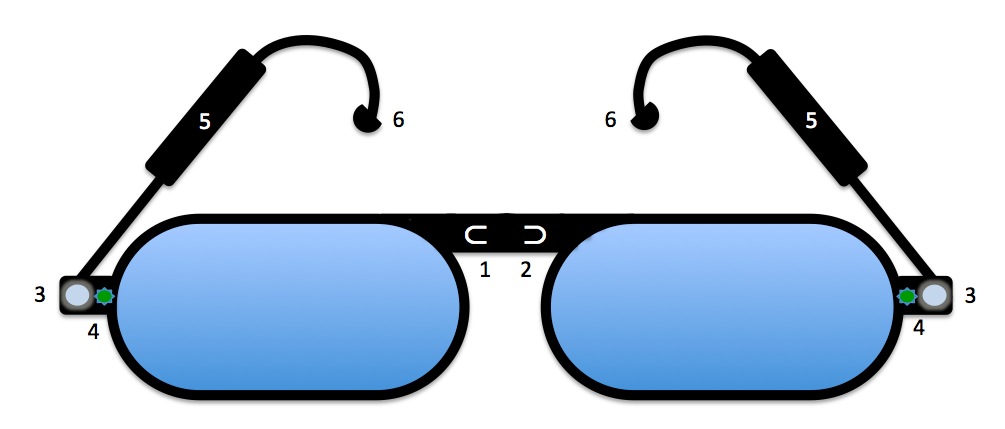 Look where Meerkat and
Look where Meerkat and Periscope point. I mean, historically. They vector toward a future where anybody anywhere can send live video out to the glowing rectangles of the world.
Periscope point. I mean, historically. They vector toward a future where anybody anywhere can send live video out to the glowing rectangles of the world.
If you’ve looked at the output of either, several things become clear about their inevitable evolutionary path:
- Mobile phone/data systems will get their gears stripped, in both directions. And it will get worse before it gets better.
- Stereo sound recording is coming. Binaural recording too. Next…
- 3D. Mobile devices in a generation or two will include two microphones and two cameras pointed toward the subject being broadcast. Next…
- VR, or virtual reality.
Since walking around like a dork holding a mobile in front of you shouldn’t be the only way to produce these videos, glasses like these are inevitable:
(That’s a placeholder design in the public domain, so it has no IP drag, other than whatever submarine patents already exist, and I am sure there are some.)
Now pause to dig Facebook’s 10-year plan to build The Matrix. How long before Facebook buys Meerkat and builds it into Occulus Rift? Or buys Twitter, just to get Periscope and do the same?
Whatever else happens, the rights clearing question gets very personal. Do you want to be recorded by others and broadcast to the world or not? What are the social and device protocols for that? (Some are designed into the glasses above. Hope they help.)
We should start zero-basing some answers today, while the inevitable is in sight but isn’t here yet.
It should help to remember that all copyright laws were created in times when digital life was unimaginable (e.g. Stature of Anne, ASCAP), barely known (Act of 1976), or highly feared (WIPO, CTEA, DMCA).
How would we write new laws for the new video age that has barely started? Or why start with laws at all? (Remember that nearly all regulation protects yesterday from last Thursday — and are often written by know-nothings.)
We’ve only been living the networked life since graphical browsers and ISPs arrived in the mid-90’s. Meanwhile we’ve had thousands of years to develop civilization in the physical world.
Relatively speaking, digital networked life is Eden, which also didn’t come with privacy. That’s why we made clothing and shelter, and eventually put both on hooves and wheels.
How will we create the digital equivalents of the privacy technologies we call clothing, shelter, buttons, zippers, doors, windows, shades, blinds and curtains? Are the first answers technical or policy ones? Or both? (I favor the technical, fwiw. Code is Law and all that.)
Protecting the need for artists to make money is part of the picture. But it’s not the only part. And laws are only one way to protect artists, or anybody.
Manners come first, and we don’t have those yet. Meaning we also lack civilization, which is built on, and with, manners of many kinds. Think about much manners are lacking in the digital world. So far.
None of the big companies that dominate our digital lives have fully thought out how to protect anybody’s privacy. Those that come closest are ones we pay directly, and are therefore accountable to us (to a degree). Apple and Microsoft, for example, are doing more and more to isolate personal data to spaces the individual controls and the company can’t see — and to keep personal data away from the advertising business that sustains Google and Facebook, which both seem to regard personal privacy as a bug in civilization, rather than a feature of it. Note that we also pay those two companies nothing for their services. (We are mere consumers, whose lives are sold to the company’s actual customers, which are advertisers.)
Bottom line: the legal slate is covered in chalk, but the technical one is close to clean. What do we want to write there?
Start here: privacy is personal. We need to be able to signal our intentions about privacy — both as people doing the shooting, and the people being shot. A red light on a phone indicating recording status (as we have on video cameras) is one good step for video producers. On the other side of the camera, we need to signal what’s okay and what’s not. Clothing does that to some degree. So do doors, and shades and shutters on windows. We need the equivalent in our shared networked space. The faster and better we do that, the better we’ll be able to make good TV.

Leave a Reply